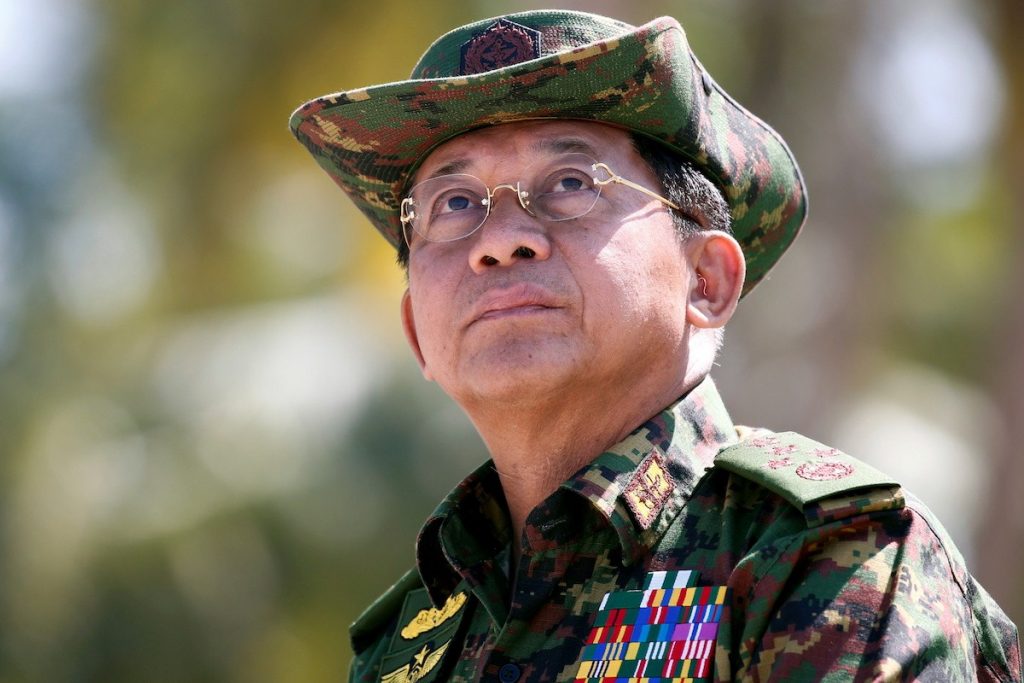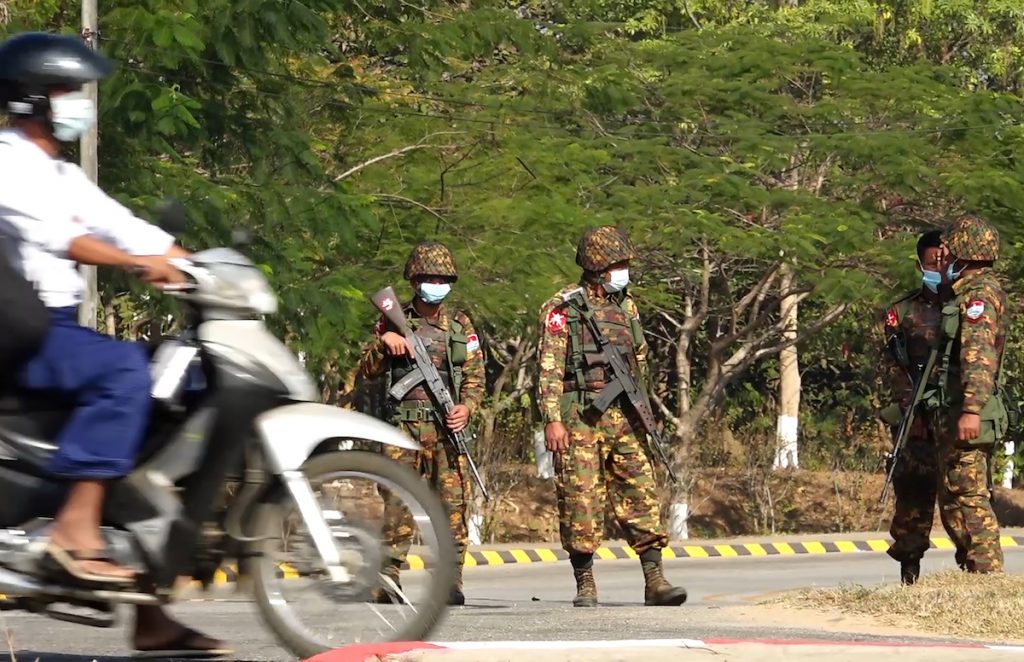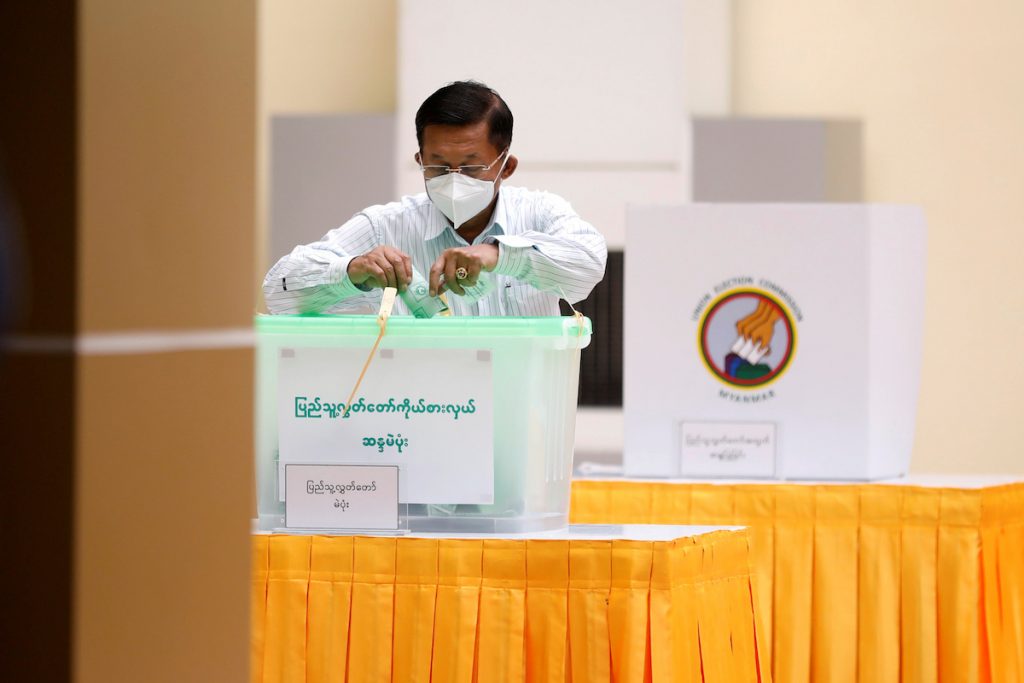
After an election last November, Myanmar’s army chief had faced imminent retirement, as well as the sidelining of the army’s favored political party and foreign calls for him to be tried for war crimes against Rohingya Muslims.
On Feb. 1, Senior General Min Aung Hlaing was in full charge of Myanmar after a coup toppled elected leader Aug San Suu Kyi, whose popularity for standing against decades of junta rule had won her another landslide.
The army acted in the name of alleged election malpractices — which the electoral commission had denied — and said it would hold a fair ballot when conditions were right and hand over to the winner.
A senior diplomat based in Yangon said Min Aung Hlaing had been driven by personal interest.
“There was no path for him to assume a leadership role in this government through the means that the constitution provided,” the envoy said on condition of anonymity.
Neither Min Aung Hlaing nor the army was available to comment on any part personal ambitions had played in the coup. Myanmar has denied accusations of war crimes and has said the military’s actions were part of a fight against terrorism.
A diminutive figure, Min Aung Hlaing often wears round, rimless spectacles that gave him more the appearance of an office clerk than commander of one of the region’s largest standing armies.
Showing signs of wanting to look more statesman-like, he had embraced Facebook and, like a politician on the campaign trail, made donations to Buddhist temples.
Some pundits had tipped him as a potential candidate for president, even though that post had previously gone to Suu Kyi’s ruling National League for Democracy (NLD).
But the pro-military party was beaten heavily by the NLD in November’s election and Min Aung Hlaing was heading for retirement as he neared the end of a five-year extension to his term, granted in 2016.
Bangkok-based Phil Robertson of Human Rights Watch said he believed the coup was sparked by the military’s frustration that they “got so clearly wiped out” in the election.

“It’s like taking a hammer to kill a mosquito — they went to the greatest extreme in a way that indicates that they’re really not on board with the democratic experiment if it doesn’t go their way,” Robertson said.
Slow and steady
Born in 1956 in southern Myanmar, Min Aung Hlaing steered clear of the political activism that was widespread at the time when he studied law at Yangon University in the 1970s.
“He was a man of few words and normally kept a low profile,” a classmate told Reuters in 2016.
While fellow students joined demonstrations, Min Aung Hlaing made annual applications to join the premier military university, the Defense Services Academy (DSA), succeeding on his third attempt in 1974.
A member of his DSA class said he had been just an average cadet who was “promoted regularly and slowly.”
Min Aung Hlaing’s career took off after he was placed in charge of operations in Myanmar’s eastern border where, in 2008, he supported a bloody crackdown on the Saffron Revolution, a monk-led protest against rising fuel prices.
A year later, he oversaw a campaign to drive armed rebels from an enclave of eastern Myanmar that violated a 20-year long ceasefire and drove some 37,000 people into China.
That success, army watchers say, was behind his promotion to army chief in 2011, the year Myanmar began its transition to democracy, paving the way for the free and fair election won by Suu Kyi in 2015. She became State Counsellor in 2016.
Powerful force
Min Aung Hlaing remained a powerful force in politics.
Using a Burmese term for the armed forces, he said in 2016: “The Tatmadaw has to be present as the leading role in national politics.”
With a quarter of parliamentary seats reserved for unelected military officers, Min Aung Hlaing was able to block amendments to the constitution that enshrined deep political powers for the military.

With three powerful ministries under military control, he had a strong hold over Myanmar’s bureaucracy. As army chief, he also reserved the right to “take over and exercise state sovereign power” in emergencies.
In 2017, the military launched a crackdown that sent over 730,000 Rohingya fleeing to Bangladesh, creating a humanitarian emergency and the world’s largest refugee camp. Min Aung Hlaing became the public face of the offensive.
“The Bengali problem was a longstanding one which has become an unfinished job,” he said, using a derogatory term for the Rohingya.
United Nations investigators have said the offensive included mass killings, gang rapes and widespread arson and was executed with “genocidal intent,” allegations the military has denied.
In response, the United States imposed sanctions on Min Aung Hlaing and three other military leaders in 2019. Several court cases are proceeding in various international courts, including the International Court of Justice.
Source: Licas Philippines
0 Comments